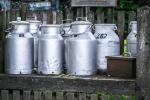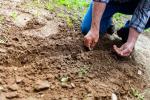H2020 AGROMIX Project: AGROforestry and Mixed Farming Systems: Participatory research to drive the transition towards resilient and efficient land use in Europe
- Type Project
- Status Signed
- Execution 2020 -2024
- Assigned Budget 6.999.254,99 €
- Scope Europeo
- Main source of financing Horizon 2020
- Project website Proyecto AGROMIX
Research for Resilient and Efficient Land Use in Europe Europe is one of the most intensively exploited continents in the world. Up to 80% of its land is used for settlements and production systems, particularly in agriculture and forestry. The EU-funded AGROMIX project aims to conduct participatory research to drive the transition towards resilient and efficient land use in Europe. It will focus on practical agroecological solutions for farm and land management, as well as for related value chains. It will also utilize a network of 83 sites covering systems of actors in mixed farming, agroforestry, and the value chain, which will be used to measure, design, model, test, and improve these solutions.
We created a conceptual framework for resilience in the context of mixed farming and agroforestry systems, identified their benefits, and developed a methodology for identifying resilience. We reviewed the extent of these systems in Europe and how these areas will be affected by climate change. We created a GIS database to model the expansion of these systems. The estimated total area of these systems in the EU is 7.7% of the utilized agricultural land. Silvopastoral land use predominates, while agroforestry systems with permanent crops are relatively rare. The results also indicate greater land-use versatility in Southern Europe.
Additional information, including small forest elements, will be published soon. We developed a participatory design approach for sustainable and resilient systems and held workshops with farmers. We also created a detailed catalog that currently includes 78 case studies in 12 countries across Europe, where information can be accessed intuitively. Our field trials have measured and collected data on key performance indicators, carbon balance, and biodiversity. All field sites have replicated trials and ongoing multi-year trials to ensure the highest possible scientific rigor. We improved models for estimating yield and designed innovative approaches to predicting the resilience of complex systems, integrating climate dataset scenarios up to 2100. We conducted multi-criteria assessment training with farmers, which included the analysis and selection of indicators for sustainability and resilience decision trees.
We developed a manual for participatory mapping using GIS and worked to support the development of an online application. We developed a conceptual framework applicable to these agricultural systems and analyzed their socioeconomic performance, highlighting differences among them in terms of typologies and economic variables. Agroforestry is not currently integrated into universally accepted accounting databases, suggesting the need to adjust economic databases to better understand the changes resulting from the integration of various types of activities.
We also assessed value chain networks to identify successful value chains, obstacles, enabling factors, and development opportunities, and analyzed infrastructure. We conducted an inventory of current policy contexts, instruments, and operational means to support mixed farming and agroforestry systems and have published two peer-reviewed policy articles. Work is underway on 14 policy co-design workshops, held in 2023, which will inform the AGROMIX policy summit in Brussels on April 17, 2024. Our analysis confirms that policies are highly heterogeneous and that agroforestry, and even less so mixed farming, is not always explicitly included or specifically supported. We formulated recommendations to change this situation. We have worked to ensure ongoing interaction and communication with all relevant stakeholders and the general public, disseminating the results to maximize impact.
We collaborate with other research projects and organize events on key topics related to resilience. We created 12 Knowledge Exchange Centers to share relevant information on studies, projects, events, and key stakeholders in different languages.
Agriculture and land use in Europe are at a crossroads: agriculture is a major driver of climate change and land degradation, creating some of the greatest challenges of our time. Farming practices that follow agroecological principles with increased agroforestry and mixed farming offer an opportunity to transform landscapes. They must become a bigger part of the solution and contribute to food systems that are truly sustainable, fair, and resilient to climate impacts and within planetary boundaries.
The AGROMIX project aims to conduct participatory research to drive the transition to resilient and efficient land use in Europe. It focuses on practical agroecological solutions for farm and land management and related value chains. AGROMIX leverages a network of 83 sites with Mixed Agriculture (MF), AgroForestry (AF), or value chain stakeholder networks, which are used to measure, design, model, test, and improve these systems. A nested approach will be used to carry out twelve co-design pilot projects across Europe.
In addition, six long-term replicated test sites are used for detailed analysis (crops and livestock). AGROMIX has six specific objectives:
- Unlocking the full potential of synergies in MF/AF systems.
- Develop and promote value chains and infrastructure for MF/AF products.
- Develop the MIX-A toolset to co-design and manage MF/AF systems in practice.
- Identify and model transition scenarios.
- Develop policy recommendations and action plans for a successful transition.
- Maximize the project's impact and legacy to build climate-resilient, low-carbon agricultural systems. AGROMIX utilizes a transdisciplinary, multi-stakeholder research approach with 10 universities, 7 research institutes, and 11 multi-stakeholder partners. It will use the Reflective Interactive Design methodology to include stakeholders in the participatory co-design and implementation of MF/AF systems.
The research begins with a work package (WP1) on context, co-creating a resilience framework.
WP2 on systems design and synergies is the core of the project.
WP3 on indicators and scenarios will refine greenhouse gas inventories for MF/AF systems and model transition scenarios.
WP4 develops and tests the MIX/serious game app. Other work topics address economics and value chains, and the joint development of policies, action plans, and dissemination that generate impact and exploitation through practical innovations on farms, in value chains, at different policy levels, and through communication and knowledge hubs across Europe.
Progress beyond the state-of-the-art includes a resilience framework for mixed agricultural and agroforestry systems, the selection of indicators for assessing the resilience of these systems, and the creation of a GIS database for integration into land-use modeling scenarios. These results are complemented by the creation of a catalog of existing sites with available quantitative and qualitative data. The participatory design methodology was implemented in six different systems and locations, complemented by sustainability and resilience assessments and the manual for participatory GIS mapping.
Fourteen co-design policy workshops were held across Europe, and a large stakeholder conference with political representation was held in Belgrade, Serbia, linked to EU accession and landscape transformation. Other outputs completed at the end of the project include: completion of data collection and statistical analysis from field trials; development of a new methodology for resilience modeling; finalization of modeled scenarios, including climate and economic data; agent-based land-use modeling; completion of co-design activities in all 12 locations; how value chains and networks should adapt; and an EU agroforestry innovation management and agroforestry policy summit with recommendations for future policies, in cooperation with sister projects.
- COVENTRY UNIVERSITY (COVENTRY UNIVERSITY)







